Undisputed Docs.
Unlock your academic potential with Undisputed Docs at an affordable price for everyone. Discover a treasure trove of study documents, from lecture notes to practice exams. Your success is our priority.
- 958
- 0
- 29
Community
- Followers
- Following
1 Reviews received
988 items
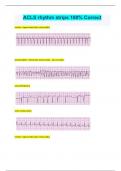
ACLS rhythm strips 100% Correct
ry supraventricular tachycardia orphic ventricular tachycardia - aka torsades
- Exam (elaborations)
- • 4 pages •
ry supraventricular tachycardia orphic ventricular tachycardia - aka torsades
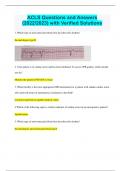
ACLS Questions and Answers (2023/2024) with Verified Solutions
1. Which type of atrioventricular block best describes this rhythm? Second degree type II 2. Your patient is in cardiac arrest and has been intubated. To assess CPR quality, which should you do? Monitor the patient's PETCOS 12-lead
- Exam (elaborations)
- • 9 pages •
1. Which type of atrioventricular block best describes this rhythm? Second degree type II 2. Your patient is in cardiac arrest and has been intubated. To assess CPR quality, which should you do? Monitor the patient's PETCOS 12-lead
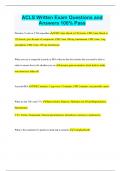
ACLS Written Exam Questions and Answers 100% Pass
Pulseless V tach or V Fib algorithm CPR 2 min, Shock at 120 Jewels, CPR 2 min, Shock at 120 Jewels, give 40 units of vasopressin, CPR 2 min, 300 mg Amiodarone, CPR 2 min, 1 mg epinephrine, CPR 2 min, 150 mg Amiodarone
- Exam (elaborations)
- • 8 pages •
Pulseless V tach or V Fib algorithm CPR 2 min, Shock at 120 Jewels, CPR 2 min, Shock at 120 Jewels, give 40 units of vasopressin, CPR 2 min, 300 mg Amiodarone, CPR 2 min, 1 mg epinephrine, CPR 2 min, 150 mg Amiodarone
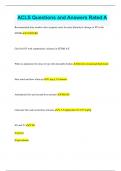
ACLS Questions and Answers Rated A
Recommended time window after symptom onset for early fibrinolytic therapy or PCI with STEMI 12 HOURS When to administer first dose of epi with shockable rhythm between second and third shock
- Exam (elaborations)
- • 11 pages •
Recommended time window after symptom onset for early fibrinolytic therapy or PCI with STEMI 12 HOURS When to administer first dose of epi with shockable rhythm between second and third shock
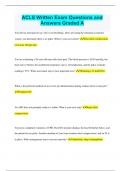
ACLS Written Exam Questions and Answers 100% Pass
Pulseless V tach or V Fib algorithm CPR 2 min, Shock at 120 Jewels, CPR 2 min, Shock at 120 Jewels, give 40 units of vasopressin, CPR 2 min, 300 mg Amiodarone, CPR 2 min, 1 mg epinephrine, CPR 2 min, 150 mg Amiodarone When you see a suspected asystole or PEA what are the first actions that you need to take in order to ensure that is the rthythm you see increase gain on monitor, check leads to make sure none have fallen off
- Exam (elaborations)
- • 26 pages •
Pulseless V tach or V Fib algorithm CPR 2 min, Shock at 120 Jewels, CPR 2 min, Shock at 120 Jewels, give 40 units of vasopressin, CPR 2 min, 300 mg Amiodarone, CPR 2 min, 1 mg epinephrine, CPR 2 min, 150 mg Amiodarone When you see a suspected asystole or PEA what are the first actions that you need to take in order to ensure that is the rthythm you see increase gain on monitor, check leads to make sure none have fallen off
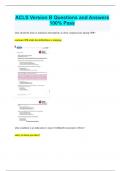
ACLS Version B Questions and Answers 100% Pass
what should be done to minimize interruptions in chest compressions during CPR? continue CPR while the defibrillator is charging what condition is an indication to stop of withhold resuscitative efforts? safety to threat providers?
- Exam (elaborations)
- • 14 pages •
what should be done to minimize interruptions in chest compressions during CPR? continue CPR while the defibrillator is charging what condition is an indication to stop of withhold resuscitative efforts? safety to threat providers?
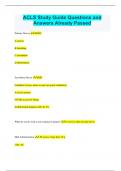
ACLS Study Guide Questions and Answers Already Passed
Primary Survey ABCD A-airway B-breathing C-circulation D-defibrilation
- Exam (elaborations)
- • 13 pages •
Primary Survey ABCD A-airway B-breathing C-circulation D-defibrilation
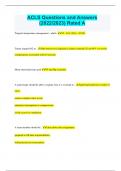
ACLS Questions and Answers (2023/2024) Rated A
Targeted temperature management - adults. 32 - 36 C (89.6 - 95.2F). Titrate inspired O2 to... the lowest level required to achieve arterial O2 sat 94% + to avoid complications associated with O2 toxicity.
- Exam (elaborations)
- • 59 pages •
Targeted temperature management - adults. 32 - 36 C (89.6 - 95.2F). Titrate inspired O2 to... the lowest level required to achieve arterial O2 sat 94% + to avoid complications associated with O2 toxicity.
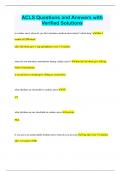
ACLS Questions and Answers with Verified Solutions
in cardiac arrest when do you first introduce medical intervention? which drug? after 2 rounds of CPR/shock after 2nd shock give 1 mg epinephrine every 3-5 minutes
- Exam (elaborations)
- • 12 pages •
in cardiac arrest when do you first introduce medical intervention? which drug? after 2 rounds of CPR/shock after 2nd shock give 1 mg epinephrine every 3-5 minutes
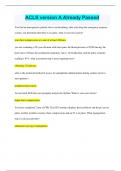
ACLS version A Already Passed
You find an unresponsive patient who is not breathing. after activating the emergency response system, you determine that there is no pulse. what is your next action? -start chest compressions at a rate of at least 100/min. you are evaluating a 58-year-old man with chest pain. the blood pressure is 92/50 mm hg, the heart rate is 92/min, the nonlabored respiratory rate is 14 breaths/min, and the pulse oximetry reading is 97%. what assessment step is most important now? -obtaining 12-lead...
- Exam (elaborations)
- • 9 pages •
You find an unresponsive patient who is not breathing. after activating the emergency response system, you determine that there is no pulse. what is your next action? -start chest compressions at a rate of at least 100/min. you are evaluating a 58-year-old man with chest pain. the blood pressure is 92/50 mm hg, the heart rate is 92/min, the nonlabored respiratory rate is 14 breaths/min, and the pulse oximetry reading is 97%. what assessment step is most important now? -obtaining 12-lead...

PA Emission Exam Questions with Complete Solutions | Verified & Updated